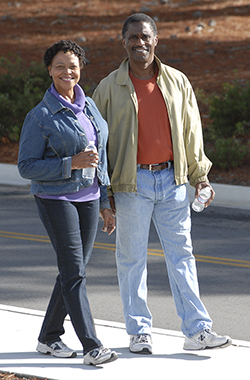A
B
C
D
E
F
G
H
I
J
K
L
M
N
O
P
Q
R
S
T
U
V
W
X
Y
Z
Click a letter to see a list of conditions beginning with that letter.
Click 'Topic Index' to return to the index for the current topic.
Click 'Library Index' to return to the listing of all topics.
After Hernia Surgery
You can often go home the same day as surgery. If you had surgery to fix a ventral or incisional hernia, you may need to stay in the hospital overnight. To speed healing, take an active role in your recovery. These tips can help.
Reducing swelling
Early on, the area around your incision may be swollen, bruised, and sore. To reduce swelling, apply an ice pack to the area 3 to 5 times a day. Keep it there for 15 to 20 minutes at a time. To make an ice pack, put ice cubes in a plastic bag that seals at the top. Wrap the bag in a thin towel or cloth before using it. Don’t put ice or an ice pack directly on the skin.
Managing pain
Take any prescribed pain medicines as told. Some pain medicines can cause constipation. So your health care provider may also have you take a laxative or stool softener. A bowel regimen is important because it keeps you from straining after your hernia repair. If coughing or sneezing is an issue, placing a pillow over your incision can help with pain. In some cases, your provider might recommend an abdominal binder. Use it as instructed and for as long as advised by your provider.
Returning to normal
You can get back to your normal routine as soon as you feel able, unless your health care provider gives you other instructions. Just take it easy and stick to these guidelines:
-
Take short walks to improve circulation.
-
Don't do any heavy lifting above 10 pounds (4.5 kg) or any strenuous exercise for at least 2 weeks and possibly longer, depending on your repair.
-
Stay out of baths, hot tubs, and swimming pools for at least 1 week or until the staples, stitches, or sticky strips are removed. This is needed to protect your incisions. You can likely take a shower sooner than that.
-
Ask your provider when you can drive and go back to work.
-
You can have sex again when you feel ready and once the stitches or staples have been removed, or when your health care provider says it is fine to do so.
-
Gradually resume your physical activities. Stop any activity that causes pain or discomfort at your surgical site.
-
If you smoke, ask your provider about various programs and choices available to help you quit smoking.

Follow-up care
Be sure to keep all follow-up visits with your health care provider. These make sure you’re healing well. During your visits, your stitches, staples, or bandage may be removed.
When to contact your doctor
Contact your health care provider if you have:
-
A large amount of swelling or bruising (some testicular swelling and bruising is normal).
-
A fever of 100.4°F (38°C) or higher, or as advised by your provider.
-
Chills.
-
Pain, redness, bleeding, or fluid from the incision that gets worse.
-
Trouble peeing.
-
Constipation.
-
Vomiting.
-
Pain that is not relieved by pain medicines.
-
Persistent coughing or shortness of breath.
-
Sutures, stitches, or staples that have come undone and the edges of the surgical wound are opening up.
Online Medical Reviewer:
Daphne Pierce-Smith RN MSN
Online Medical Reviewer:
Melinda Murray Ratini DO
Online Medical Reviewer:
Vinita Wadhawan Researcher
Date Last Reviewed:
3/1/2025
© 2000-2025 The StayWell Company, LLC. All rights reserved. This information is not intended as a substitute for professional medical care. Always follow your healthcare professional's instructions.